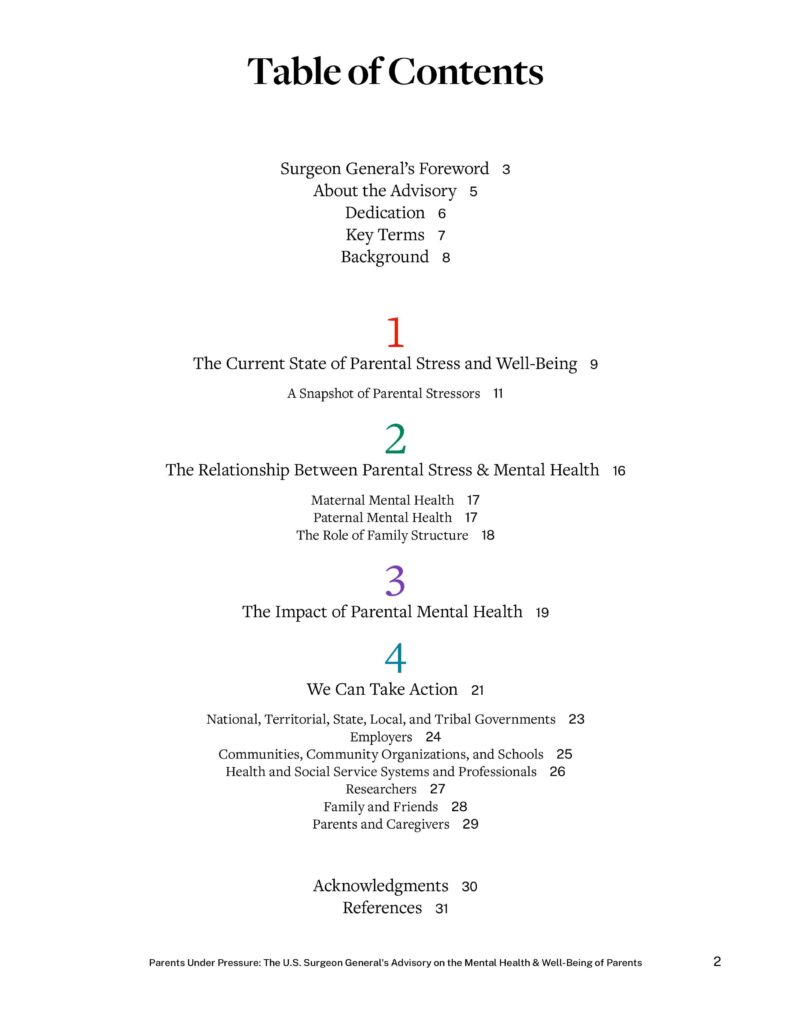The U.S. Surgeon General’s advisory highlights the challenges parents face today and emphasizes the need for a collective approach to support both parents’ well-being and their children’s health.
To get an overview of what the advisory discusses, check out the table of contents below.

In the advisory’s call to action, Dr. Vivek Murthy provides actionable recommendations for parents.
What Parents and Caregivers Can Do
Remember, caring for yourself is a key part of how you care for your family. Some activities that can help reduce stress include exercise, sleep, a balanced diet, mindfulness, meditation, and recreational activities that bring joy. 155 It can be difficult to prioritize yourself amid the demands of parenting, but even small investments of time in stress-reducing activities can make a meaningful difference. Setting healthy boundaries that allow one to take such time should not bring guilt or shame but rather be seen as vital actions that can ultimately benefit parents and caregivers as well as their children. Finally, it is impossible to get parenting right all the time, so being compassionate and forgiving with oneself is essential.
Nurture connections with other parents and caregivers. Parenting is best done with the support of other parents, family members, and friends. Seek out or create relationships with parents of children across age groups. Such community can provide opportunities to share your feelings, concerns, and challenges while also learning from the experiences of other parents. Fostering a supportive environment can help reduce the stresses of parenthood. Mental Health America offers opportunities to connect with fellow parents and caregivers in your local community or virtually.
Explore opportunities to secure comprehensive insurance coverage for yourself and your family. Health insurance has a positive impact on overall health and mental health-related outcomes. Having reliable coverage for physical and mental health needs can reduce stress and provide security when health needs arise. To learn more about enrolling in Medicaid, CHIP, or a Marketplace plan, go to HealthCare.gov.
Empower yourself with information about mental health care. Educate yourself with credible resources about mental health.156, 157 For information on accessing health care or support, including treatment options, how to pay for treatment, ways to cope, and how to assist others with finding treatment, visit FindSupport.gov. Recognize how mental health challenges manifest and seek help when needed.156 Mental health is just as important as physical health. If you
feel bad and are not getting better, you need and deserve additional care. Don’t be afraid to ask for support from a peer, family member, mental health provider, or any medical professional.
If you are pregnant, a new mom, or a loved one of an expecting or new mom facing a mental health challenge, call or text the free Maternal Mental Health Hotline at 1-833-TLC-MAMA (852-6262) for 24/7 confidential support in English or Spanish. If you’re experiencing a mental health crisis, call or text the free, multilingual, and confidential 988 Suicide & Crisis Lifeline.
This is a short excerpt of the report. Read the full advisory here.



